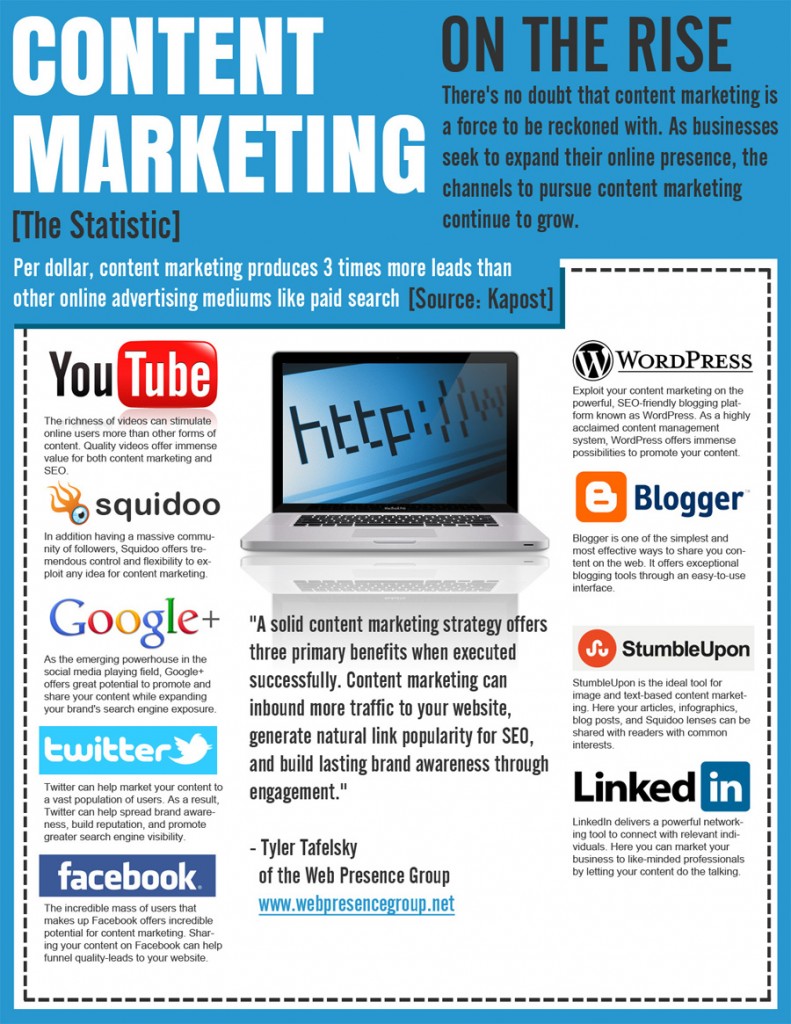When has it ever been wise to try to be someone or something you’re not? Ultimately it’s an inefficient use of energy and, after a lot of blood sweat and tears, you’re likely to draw the conclusion that being yourself is what you’re best at anyway.
The same should apply to being a small business owner. If you’re a small business owner, why would you pretend to be a large business owner? Instead, promote yourself as a big resource in a little package. As a small organization, you have the advantage of being able to adapt swiftly to new ways of engaging customers rather than having to wade through a lot of bureaucracy before engaging a new plan. That ability to experiment and implement quickly as well as creatively can be a big advantage, especially when it comes to content marketing.
Here are a few ways small businesses can use content marketing in combination with some SEO and Social Media Smarts to be a “bigger” resource for online customers.
1. Blog: Anyway you can position yourself as an expert or mentor is beneficial in driving traffic to your website. The more you write, the more searches you will show up in on search engines and the more prospects who will be exposed to your company and brand. By using a blog as a useful resource for prospective and current customers, you will attract business at a faster rate than most of your larger competitors with a 10-year head start.
2. Newsletters & Email Marketing: Email newsletters are a cheap and easy way to connect directly with prospective customers as well as stay connected to current customers. Newsletters can be published as blog posts for discovery via search engines and can provide a great segue from social relationships on social networks like Facebook or from a blog to more commercial relationships with prospects. Newsletters provide a way to offer useful and targeted information to nurture leads and provide opportunities to find out more on products and services.
3. Media Coverage & Contributed Articles: Getting mentioned in the local business media and trade publications can boost awareness, credibility and directly generate new business. Make a list of local business publications, writers and editors as well as popular trades and bloggers. Send them relevant news about your company in a concise and compelling format.
Nurturing a positive and consistent relationship with individual journalists is key to garnering positive publicity. Receiving an email directly from the CEO or a VP of a small business creates a direct connection that many time-pressed journalists appreciate. Additionally, if they blog, make comments that add value, then follow up with more detailed, useful information. Provide “hooks” that give perspectives and insights not normally thought of. Stand out and tell a compelling story.
4. Resource Center: One way small businesses are beating their larger competitors in search and in building authority is to be a better resource for customers through useful content. Common formats for helpful information about buying, using and related information on products and services include articles, videos and podcasts.
5. Social Networks & Media: Get to know your prospects and offer them the chance to get to know you. In other words, utilize the social networks that are most relevant to customers. It doesn’t need to be a lot of time, but a small amount of time consistently spent on interaction and relationship building can go a long way at developing a community.
6. Events: Just as importantly as getting to know your customers online is getting to know them in the real world. Events are a great way to connect with prospective customers, marketing partners, new employees and colleagues. They’re also a great place to create content.
As a small business, should you attempt to do all of these things? Probably not. There are only so many hours in the day after all. Our recommendation is to start small and focus on what works. And, as always, if you need us, we’re here for you.

